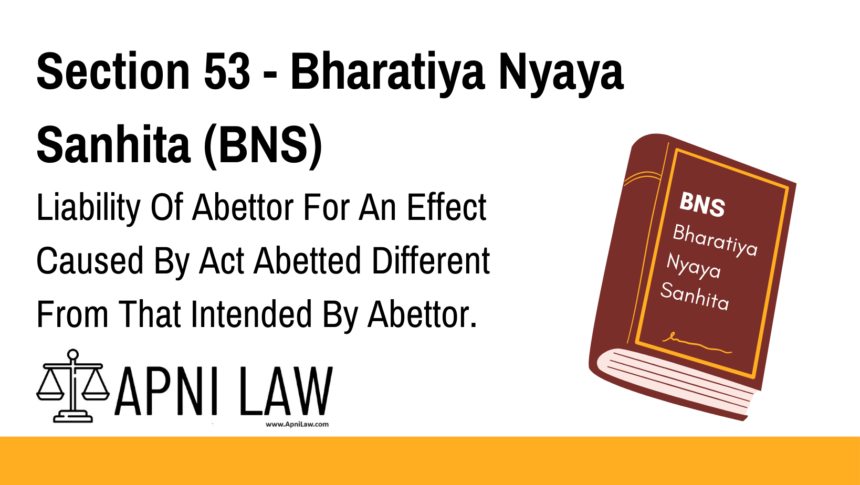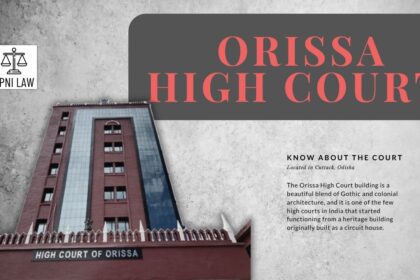Code: Exact Text of Section 53 BNS
When an act is abetted with the intention on the part of the abettor of causing a
particular effect, and an act for which the abettor is liable in consequence of the abetment,
causes a different effect from that intended by the abettor, the abettor is liable for the effect
caused, in the same manner and to the same extent as if he had abetted the act with the
intention of causing that effect, provided he knew that the act abetted was likely to cause
that effect.
Illustration.
A instigates B to cause grievous hurt to Z. B, in consequence of the instigation,
causes grievous hurt to Z. Z dies in consequence. Here, if A knew that the grievous hurt
abetted was likely to cause death, A is liable to be punished with the punishment provided
for murder.
Explanation of Section 53 BNS
1. Concept of Unintended but Foreseeable Consequences
- This section deals with situations where an abettor instigates a person to commit an act with a particular intent, but the actual outcome is different from what was intended.
- The abettor remains liable if they knew that the act they abetted was likely to cause the unintended effect.
2. Key Elements of Liability Under Section 53
- The abettor had a specific intention regarding the act.
- The actual result of the act was different from what was intended.
- The abettor knew that the act was likely to cause that effect.
This ensures that individuals cannot escape liability just because the exact effect of the crime was different from what they planned.
Illustration of Section 53 BNS
Example from the Law
A instigates B to cause grievous hurt to Z.
- B, following A’s instructions, causes grievous hurt to Z.
- Z dies as a consequence.
- If A knew that grievous hurt could lead to death, then A is liable not just for abetment of grievous hurt but also for murder.
More Examples
1. Arson Leading to Death
- A hires B to set fire to a shop to threaten the owner.
- The fire spreads and kills a sleeping worker inside.
- If A knew that the fire could result in death, A is liable for abetment of murder.
2. Road Rage Incident
- A tells B to push Z forcefully to teach him a lesson.
- B pushes Z, and Z falls, hitting his head on a sharp object and dying.
- If A knew the push could lead to serious injury or death, A is liable for abetment of culpable homicide or murder.
3. Poisoning with Unintended Consequences
- A gives B a mild poison to make Z sick.
- Z, due to an unknown allergy, dies.
- If A knew the poison could potentially kill, A is liable for abetment of murder.
Common Questions and Answers on Section 53 BNS
1. What is the core principle behind Section 53?
The law holds abettors responsible for the actual effect of the crime, even if it differs from their original intention, as long as they knew it was likely to happen.
2. How is this different from Section 51 and Section 52?
- Section 51 BNS: Makes an abettor liable when a different act is done instead of the abetted act.
- Section 52 BNS: Imposes cumulative punishment if both acts (abetted and actual) are punishable separately.
- Section 53 BNS: Holds an abettor liable for a different effect if they knew the act was likely to cause it.
3. Does this mean an abettor can be punished for murder even if they only intended assault?
Yes, if the abettor was aware that the assault was likely to cause death, they can be punished for murder.
4. Can an abettor escape punishment by saying they didn’t intend the final consequence?
No. The law applies if the abettor knew the unintended effect was a possible outcome.
5. How does the court determine if the abettor “knew” about the possible effect?
The court considers:
- The nature of the act abetted.
- The probability of the effect occurring.
- The knowledge and awareness of the abettor at the time of abetment.
Conclusion
Section 53 of the Bharatiya Nyaya Sanhita (BNS), 2023, ensures that abettors cannot escape liability just because the effect of the crime was different from what they originally intended. If they knew the unintended effect was likely, they will be punished as if they had intended it.
For more legal insights, visit ApniLaw today! 🚀








